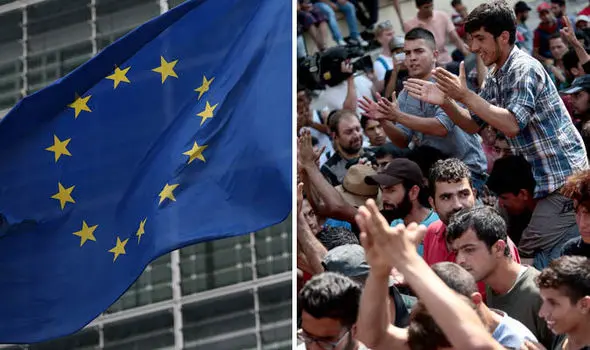The debate held here on Wednesday at the Parliamentary Assembly of the Council of Europe (PACE)'s winter session made it clear that the new battle underway in Europe turns around the question of the number and the origins of refugees in a context generally growing more hostile toward migrants.
At PACE, which examined two reports, one on Mediterranean Sea migration and the other on organized crime and migrants, new dissensions are rising up in regard to the nature of the flow of migrants confronting Europe.
Members of the assembly, on the basis of the reports, have adopted two resolutions: one calls for international cooperation in order to efficiently fight human traffickers; the other requests the creation of "hot spots" (sorting centers) outside of Europe in order to "process asylum requests and save lives."
The ideological battle still provokes angry words in the hemicycle of the Council of Europe (CoE), as it does in the European Parliament between the defenders of solidarity and moral obligations to receive migrants, and those, more and more numerous, who demand the closing of borders and denounce "the suicidal illusions of multiculturalism," "the denial of reality," or even "the incompatibility of Islam with European values."
But beyond the question of values, it is now the issue of the legitimacy of the asylum seekers and their numbers which has taken the stage in European rhetoric. "To make the difference between those who really have a need and the others," "to not let ourselves be influenced by images of women and children in tears," "to stop being hypocrites," and other such phrases resonated on Wednesday in Strasbourg as leitmotifs, and echo the booming declaration made last Friday by French Prime Minister Manuel Valls. Speaking to the BBC, Valls effectively stated that Europe could not accept all the refugees coming from Syria or Iraq, "otherwise our societies will be totally destabilized."
Monday, it was the European Commission's turn to drive the point home via its spokesperson Natasha Bertaud. She affirmed, on the basis of statistics that the European border agency Frontex has not yet made public, that in December, the number of arrivals which do not meet the conditions necessary to obtain the right of asylum was significantly higher than for the rest of 2015. These "economic migrants" represent "nearly 60 percent" of the number of total arrivals in December. According to Bertaud, "the sympathy of the citizens toward asylum seekers would be weakened if the people who didn't have the right to international protection were also authorized to stay in Europe."
The statistics provided by Frontex, however, have been the subject of controversy since last autumn. The agency was, in fact, forced to admit that many of the refugees and migrants had been counted twice. The International Organisation for Migration (IOM) confirmed for its part that approximately 37,000 migrants and refugees had already arrived by sea in Italy and Greece in 2016, or close to 10 times the total in 2015 by the same date. For Greece and the Western Balkans, this increase represents more than 20 times the total from this time last year.
"International organizations should work together and adopt the same criteria," underlined a researcher at the European Policy Center in Brussels, Yves Pascouau, who confirmed that he no longer uses statistical data furnished by Frontex, IOM, or even Eurostat. "They bombard us with unreliable numbers, which doesn't impede the creation of a dangerous impression that the migratory phenomenon has become unmanageable in Europe. That is totally false," he deplored.
These numbers conceal other statistics that European leaders do well to hold back so as to not reinforce even further the sentiment that the European Union's (EU) system designed to manage the refugee crisis doesn't function. To start with, the implementation of "hot-spots" for the registration of asylum requests has undergone significant delays and is being strongly criticized by local organizations. These relocation centers have the goal of sorting and identifying refugees: the Eritreans, Syrians and Iraqis, and any others, who are finally considered as economic migrants, must leave the territory within seven days.
In France, 43 migrants originating in Syria, Iraq, and Eritrea arrived Monday in the department of Loire-Atlantique (Western France) from an asylum center in Greece. After the 19 Eritreans received last November, this group brings the number of refugees relocated to France at 62. Paris, nevertheless, committed to receive over two years 30,000 refugees of a total European objective of 160,000 people relocated.
Greece, which has taken the brunt of what has become known as the "burden" of the refugee crisis, has been threatened with the suspension of the Schengen Zone by European right-wing parties, who accuses the country of not having put hot-spots in place.
In regard to the agreement concluded between the EU and Turkey (where at least 2.2 million refugees fleeing the civil war in Syria have settled temporarily), and which promised to reduce the flow of refugees in exchange for aid worth 3 billion euros (3.59 billion U.S. dollars), the effects have not been seen. Despite the winter season, boats continue to arrive every day to the Greek islands.
 简体中文
简体中文

